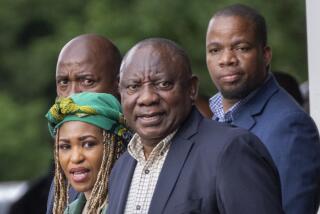Aides, Police Help Protect Freed Leader : Security: Mandela’s eagerness to be with followers complicates the task. Authorities have warned of possible danger from extremists.
- Share via
JOHANNESBURG, South Africa — Freed nationalist leader Nelson R. Mandela, who the government warns may be a target of left- as well as right-wing extremists, is being protected during his early days of freedom by aides guarding the schedule of his movements and even, occasionally and at discreet distances, by contingents of white South African police.
But his security arrangements have been complicated by his urgent desire to speak to his followers.
“One can do one’s best to protect him,” said Audrey Coleman, an adviser to the committee planning Mandela’s reception across the country, “but he’s determined to be with the people. And that’s that. We’re not experts on security. How could we be?”
The 71-year-old African National Congress leader spent his first two nights of freedom in secret locations, Sunday night in Cape Town and Monday night in Johannesburg. No one knows for sure when he will return to his modest home in Soweto, which is surrounded day and night by thousands of people hoping for a look at the man who was released Sunday after 27 years in jail.
“He’s got to get to his house sometime,” Murphy Morobe, a leader of the reception committee, said Monday, “and we’ve got to find a way to get him there.”
Morobe added that Mandela’s “security is the support the people give him.”
On Monday, Mandela and his wife flew to Johannesburg from Cape Town on a chartered plane, landing at a commercial airstrip that was heavily guarded by South African police. He was driven away, and aides declined to say where he would spend the night.
Earlier in the day, Eugene Terreblanche, leader of the militant far-right Afrikaner Resistance Movement, which opposed President Frederik W. de Klerk’s decision to release Mandela, predicted increased violence in South Africa now that Mandela is free.
“As a result of this situation, conflict is unavoidable,” Terreblanche said. He added that the government is too weak to meet the revolutionary challenge of Mandela’s African National Congress, the primary guerrilla group fighting white minority-led rule.
“We will protect ourselves and our property when the government can no longer do so,” Terreblanche said.
A few hours later, in central Johannesburg, one black man was killed and four were wounded when a security guard opened fire on a group of ANC supporters who had gathered in the street to celebrate Mandela’s freedom. Police said that the group had thrown bottles and stones at the guard, who was standing in front of a building under construction, and then had cornered him.
The government has offered to provide security for Mandela, if he requests it, but so far the release committee has not asked for large-scale assistance, believing that the presence of armed policemen around Mandela could cause more trouble.
“Most of our leaders are exposed in any case. That is the price we pay,” said Dullah Omar, a leader in Cape Town of the United Democratic Front, an anti-apartheid coalition.
The UDF called on Monday for whites to see the release of Mandela as “a step toward normalizing relations among all our people. Rather than reacting violently, all the people, black and white, must rejoice.”
Officials on the release committee say that while they believe some right-wing whites might try to attack Mandela one day, they are more worried now about protecting the freed leader from the crush of the large crowds that have turned out to welcome him.
As a result of those fears, a rally that Mandela is scheduled to address today in Soweto was moved to a soccer stadium that holds 100,000 people, and hundreds of marshals were being trained to control the crowds.
On Sunday, 50,000 people had gathered in the Grand Parade in Cape Town to hear Mandela speak. But the ANC leader was delayed when his wife and other anti-apartheid leaders arrived late to collect him from the Victor Verster prison farm. Mandela was further delayed as he took welcoming phone calls from around the world.
The crowd, which had waited for nearly five hours in a hot sun to hear Mandela, grew increasingly unruly, and 100 youngsters began breaking windows and looting downtown stores. The police, who remained outside the parade grounds, fired dozens of rounds of birdshot at the looters, killing one and injuring more than 100.
At the same time, the well-wishers pressed toward the podium from which Mandela was to speak, raising fears that some would be trampled. Mandela’s aides briefly considered canceling speech.
More to Read
Sign up for Essential California
The most important California stories and recommendations in your inbox every morning.
You may occasionally receive promotional content from the Los Angeles Times.











